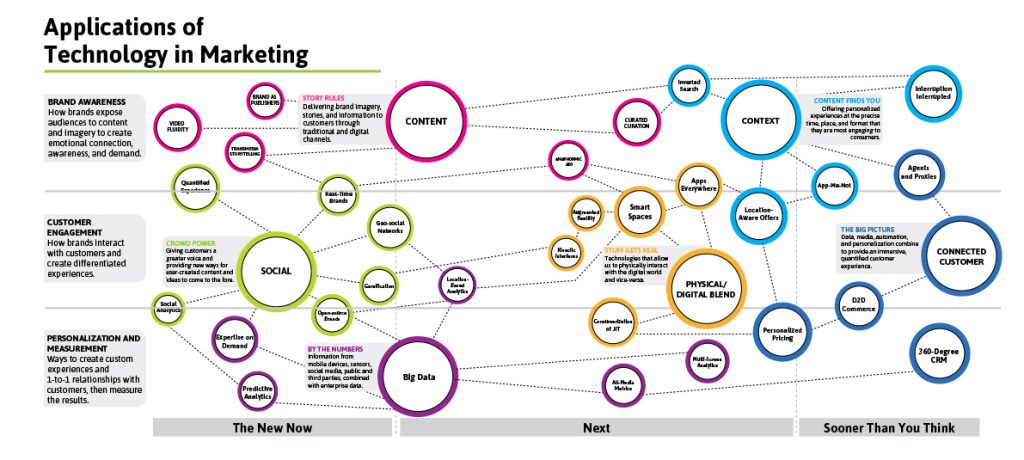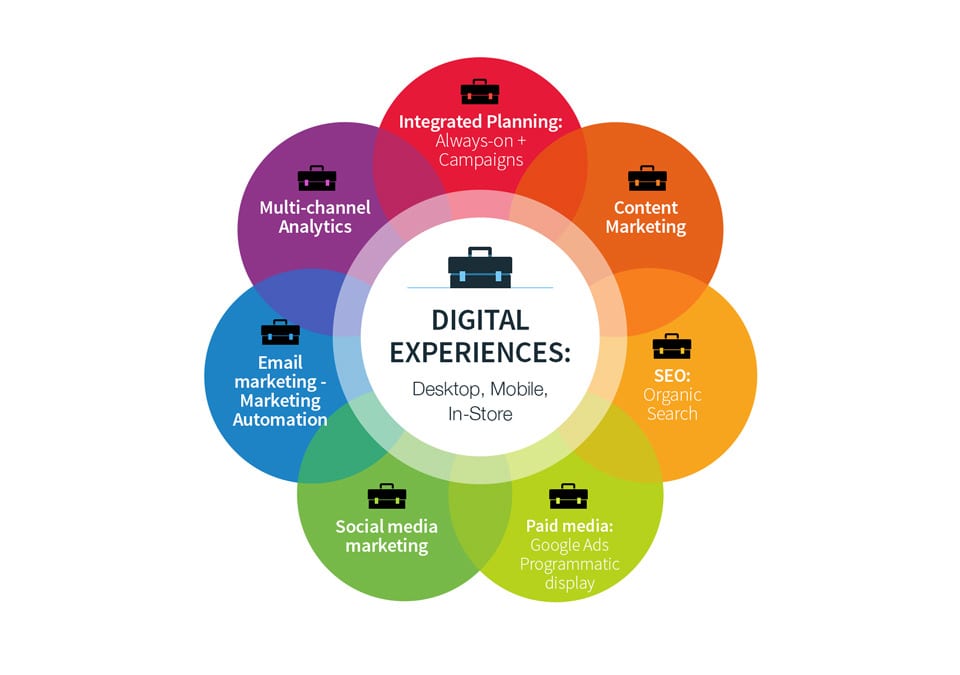
Technological Digital Marketing: The Expanding Role of Artificial Intelligence
In the realm of technological digital marketing, the integration of digital technology has ushered in a new era of innovation and efficiency. Artificial Intelligence (AI), in particular, has emerged as a powerful tool reshaping how companies engage with customers and craft their marketing strategies. This essay explores the expanding role of technological digital marketing and AI in marketing, highlighting its transformative impact on personalized experiences, data analysis, and marketing automation.
Additionally, AI assists marketers by enabling efficient data analysis. It is critical for technological digital marketing to be able to identify consumption patterns and consumer behaviors, as it allows them to create precise, effective marketing strategies based on individuals’ preferences. Through AI systems, marketing and product development processes can be streamlined by analyzing customer feedback and online behavior.
Enhancing Customer Experience through Personalization
Personalized marketing messages created by AI extend beyond product recommendations to resonate more deeply with different segments of consumers. Artificial intelligence can help build lasting relationships with customers by improving customer engagement rates. The use of technologies that suggest products uniquely suited to an individual based on their past purchases has caused major companies to see increases in sales and customer satisfaction.
Further, the AI technologies’ real-time processing capabilities allow marketing campaigns to be adapted instantly based on the interaction of the consumer with the brand. There are significant benefits to using this dynamic method of marketing when it comes to the allocation of budgets and the effectiveness of campaigns, which ensures that companies are not losing money on advertisements that are not performing well.
Big Data’s Role in Marketing Decisions
By providing consumers with the necessary insights into consumer behavior and market trends, big data complements artificial intelligence in crafting sophisticated marketing strategies that result in superior results. Through the use of big data analytics, companies are able to go into the specifics of what drives consumer preferences as well as market dynamics, which enables them to make predictions about future trends and behaviors. In fast-paced technological digital marketing environments, this kind of insight is extremely valuable for companies looking to maintain a competitive edge and remain competitive.
In addition, by taking advantage of big data segmentation capabilities, marketers will be able to provide their customers with even finer levels of personalization, focusing on specific demographics, geographic regions, and even psychographic characteristics about their customers with unprecedented accuracy. It is through such detailed segmentation that marketing efforts can be not only more focused, but also more cost-effective, thus maximizing the return on investment of the marketing campaigns.
Integrating Marketing Automation for Efficiency
The advent of technological digital marketing automation technology has greatly enhanced the efficiency of marketing efforts. Automation tools can handle routine tasks such as email marketing, social media postings, and even complex campaign management, allowing human marketers to devote their time to strategic planning and creative content creation. These tools help manage the entirety of a marketing campaign, from inception through execution to analysis, providing a seamless flow of activities and a comprehensive overview of campaign performance.
Marketing automation not only boosts efficiency but also ensures consistency in communications and helps maintain a coherent brand voice across all channels. This consistency is crucial for brand recognition and customer trust, which are foundational to successful marketing.
The Future of Programmatic Advertising
Programmatic advertising exemplifies the integration of AI in advertising, where ad placements are conducted through automated systems that make decisions in real-time. This efficiency not only reduces the labor involved in manual ad placement but also enhances the relevance of ads presented to consumers by leveraging data insights to target audiences more accurately.
As programmatic technology evolves, it will likely incorporate more advanced AI capabilities, such as deep learning, to further refine ad targeting and effectiveness. This evolution will continue to push the boundaries of what automated systems can achieve in advertising, potentially leading to more personalized and engaging advertising experiences that are optimized for conversion.
Technology-Enhanced Content Marketing
Beyond automation and data analytics, technology is profoundly influencing the content creation and distribution landscape. Advanced content management tools help marketers plan, execute, and monitor content strategies with greater efficiency and effectiveness. These tools can suggest topics likely to perform well among target audiences and identify the best channels for distribution.

This is a photo showing the impact of technology on Marketing
Transformative Influence of AI in Social Media
The article authored by Sudeep Srivastava (2024) serves as a comprehensive exploration of the transformative influence of artificial intelligence (AI) on social media. It delves into the myriad ways AI reshapes user experiences, informs marketing strategies, and drives innovation within the digital landscape.
Strategic Advancements in User Interaction
As a result of AI in social media, user interaction and business growth will be fundamentally altered. By automating tasks like content moderation, creating chatbots for customer support, and refining marketing campaign targeting, AI creates a more engaging and personalized experience for users. The result is an increase in user engagement and conversion rates, propelling businesses towards sustainable growth (Srivastava, 2024) .

Empowering Insights through Analytical Tools
Businesses are provided with invaluable insights into the preferences and trends of their customers through the implementation of AI-powered analytical tools. It is through data such as this that companies can modify their marketing strategies, introduce new products, and maintain a competitive edge in the ever-evolving digital environment. As Srivastava (2024) points out, AI is increasingly being used in the business world to enable companies to remain on the cutting edge of technological advancements, enabling social media platforms to become dynamic, engaging, and data-driven tools for driving business growth and customer engagement for the years to come.
Application of artificial intelligence (AI) in social media in a variety of ways
Besides its operational benefits, artificial intelligence (AI) in social media encompasses a wide range of applications that enhance the user experience as well as simplify business processes. AI is now providing businesses with the tools to understand public sentiment, align content with trending topics, identify influential figures, and optimize marketing campaigns, from sentiment analysis and trend tracking to influence marketing and advertising management. There is no doubt that AI has the ability to revolutionize diverse facets of social media operations, and these applications illustrate AI’s versatility (Srivastava, 2024).
Projected Growth and Industry Adoption
There has been a tremendous increase in the adoption of artificial intelligence technologies across the social media sector, which is expected to reach $2.2 billion by the year 2023 at an incredible compound annual growth rate of 28.3%. As a result, this is a testament to the widespread adoption of Artificial Intelligence across the industry (Srivastava, 2024). A significant part of this trajectory is the increasing recognition of AI’s pivotal role in the digital landscape, as well as the profound impact that AI is having on shaping the digital landscape and propelling innovation across a wide range of industry sectors.
Accelerating Technological Advancements (these are all from this article)
As AI adoption surges, it reflects a collective recognition that AI holds the potential to revolutionize the user experience and optimize business operations, thus revolutionizing the bottom line. A new era of innovation and growth is bringing about as businesses increasingly use AI-driven technologies to enhance user engagement, refine marketing strategies, and unlock new revenue streams.
With AI integrating into marketing, companies are reshaping how they interact with customers, creating more personalized experiences. Personalized content recommendations and 24/7 customer service are made possible by artificial intelligence technologies, including chatbots and machine learning algorithms. AI assists marketers by enabling efficient data analysis. It is critical for marketers to be able to identify consumption patterns and consumer behaviors, as it allows them to create precise, effective marketing strategies based on individuals’ preferences.
Global Implications and Future Prospects
Additionally, social media has an impact on a variety of facets of societal and economic landscapes beyond the confines of social media. With AI’s transformative abilities, educational outcomes will be enhanced, learning environments will be cultivated in a more engaging manner, and advancements in various industries will be driven. Its integration into social media serves as a harbinger of broader societal transformation, reshaping the digital landscape and catalyzing innovation globally as AI continues to evolve and permeate diverse sectors.
Conclusion
Accordingly, Srivastava’s (2024) exposition of AI in social media illuminates its potential for transforming user experiences and transforming business operations. Business can use AI-driven technologies to navigate the digital terrain with agility, using data-driven insights to drive growth, foster innovation, and shape engagement and interaction in the future. In the coming years, AI’s integration into social media will result in unprecedented innovation, connectivity, and opportunities, redefining the contours of the digital landscape.
Be sure to check out my last blog on web analytics which also talks about the use of AI here.
